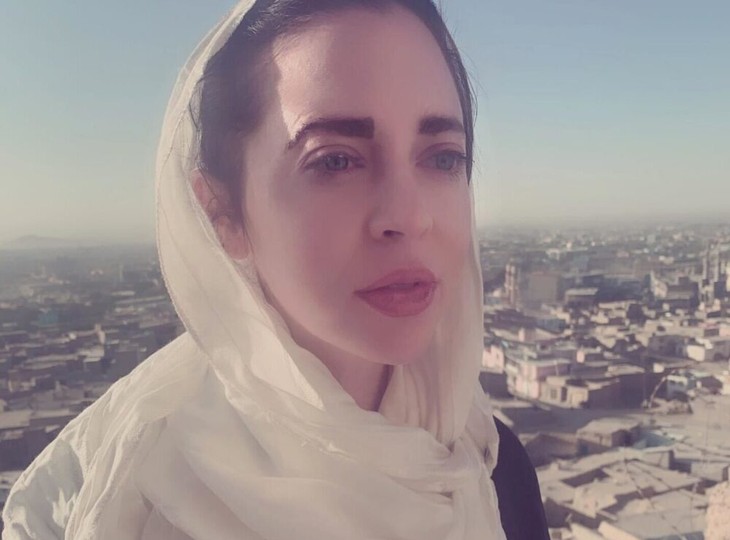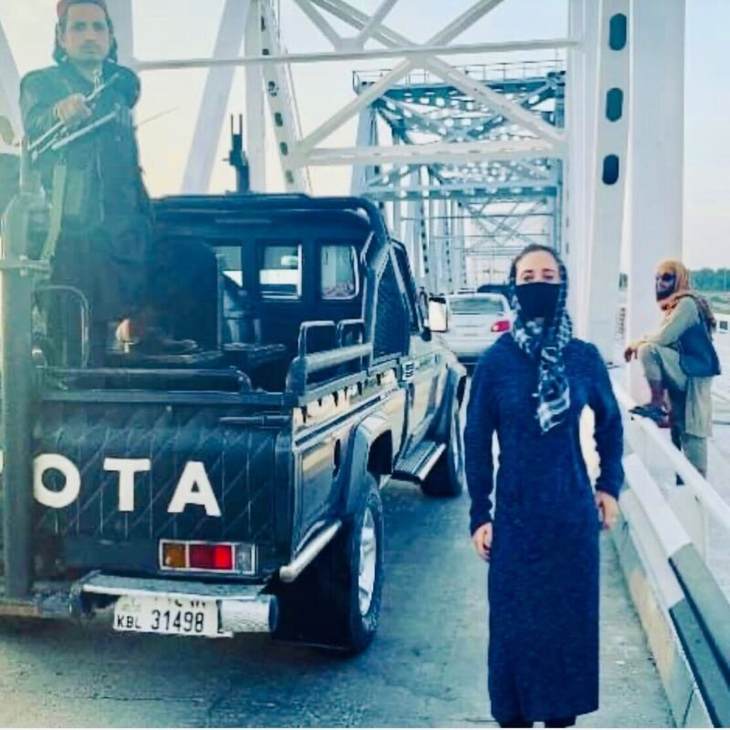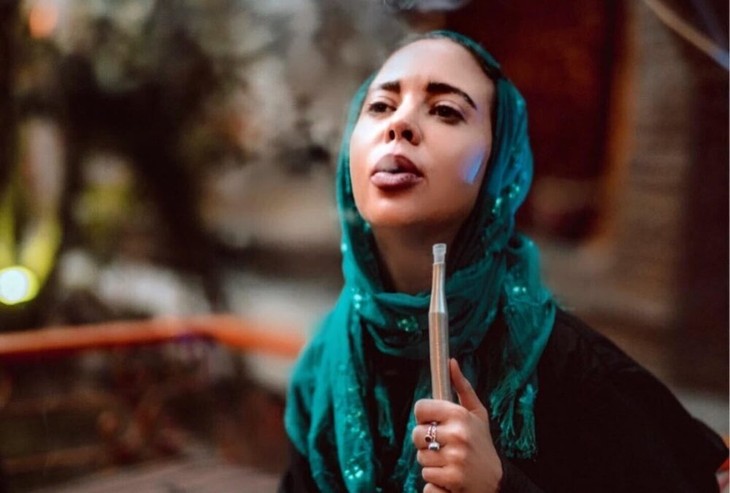In 2001, the very first battles against the Taliban and Al Qaeda in the Global War on Terrorism took place in the northern territories of Afghanistan, centered around the city of Mazar-e Shariff. In 2021, Mazar fell to the Taliban one day before the capital, Kabul, succumbed. The lone western journalist in that city on that day was investigative reporter Hollie McKay, whose exclusive reporting was published at RedState during the fall and its immediate aftermath, including her harrowing escape from the country.
In this exclusive interview, we visit McKay and go over the year that has passed since the disastrous US surrender. We remember the day the country fell, the chaos of the first month, Hollie’s travels back to Afghanistan to witness how things changed after the Americans left, and how things have become today. Hollie also shares her perspective on Afghanistan with the benefit of one year of hindsight and as compared to her experiences in other conflict zones, like Ukraine, where she has worked since leaving Afghanistan at the end of 2021.

The following is a transcript of the interview; the full video follows the transcript.
Dennis: It’s the anniversary of the US departure from Afghanistan. Today I’m interviewing the person that I think has the closest on-the-ground experience of what that was like Hollie McKay, welcome.
Hi, Dennis, thanks for having me.
Let’s start with the fall of Afghanistan because I got a text message from you from Mazar E Sharif on the day that the fall began. You found yourself in a very unique position as one of the very few Western reporters who was not camped out at the Kabul International Airport. You were in a northern city where the Taliban were moving in after negotiating with the former government for essentially easy access to the country. What was that like?
It was obviously very surreal. Jake Simkin, who’s my photographer, and I had gone to Mazar from Kabul on a commercial airliner a few days before the actual fall. We were there under the invitation of Marshal Dostum, who everybody sort of remembers as being one of the warlords from the very beginning when the US entered the war after 9/11 and a lot of the Green Berets came in from the north through Mazar. That was sort of the first place to kick the Taliban out essentially.
And that was Dostum’s area. He is an Uzbek in Afghanistan and was also the vice president. We were there with the invitation from him. The assurances that I got that week from Kabul from NDS, which is their intelligence branch, was that there was no way that Mazar would ever fall, especially under Dostum rule, and so we felt fairly confident in going, despite the fact that a lot of the provinces surrounding Mazar e Sharif in the north had fallen to the Taliban.
And it sort of just goes to show you, I guess, the lapse of awareness of the situation that all these officials we’re so confident that Mazar would hold. It really included the night before the fall too. We were out with some of the special forces, the Afghan commandos, and again they were very persistent that there was no way they would ever let Mazar fall.
When it did and it was, it was a strange Saturday. Very bizarre. People were fleeing. There wasn’t really a way out for us. The earliest commercial flight, which we had already booked to get back to Kabul wasn’t until Monday evening, so we had this 48-hour window of, “We hope it holds for two days.” Because it just didn’t feel right.
There were a lot of bizarre things that were happening. As I said, people fleeing, we couldn’t get hold of a lot of people who had left Mazar and fled to Kabul because they believed Kabul would at least hold. Right up into that afternoon when we came back. I was making calls again to officials and they were saying it’s not good, but we think it will hold.
And at that point, there really wasn’t anything that Jake and I could do, we couldn’t leave via road because there was still quite a war going on. The Taliban controlled those arteries out. It’s quite a distance to Kabul. It’s about a twelve-hour drive, and that is without a war.
So, it was quite bizarre. I remember we went to get kebabs, which we normally did in the evening, and there was really nobody on the street. The livelihood that we’d seen in Mazar in the days prior was certainly gone. And then, as we looked at each other and said, we needed to leave, we needed to go back to the hotel. Uhm, you just saw these groups coming in on motorcycles. That really was the Taliban.
It was baffling because that whole day, while the fighting was happening outside the city, we didn’t hear any aircraft. We didn’t hear this $80 million Air Force that the US had built for Afghanistan. It just wasn’t in existence. There was no bombing campaign. There was not even any military or police presence on the street. I remember thinking that was so strange because if this city really was sort of under siege, which it was, you know, where are the police? Where is the military? I would have thought that there would be forces on the ground. But there was — it was sort of the Wild West. There was nothing. And in that, I guess it was a very confusing time.
It [Mazar] fell in the early evening. I remember we went to the roof of this hotel, which was the tallest building in Mazar. So, you could see out. And we’re trying to figure out what was going on, like, had it fallen? Hadn’t fallen? Who are the people on the motorcycles? I was talking to an old fixer of mine in London and he’s the one that was telling me that it had fallen.
And then, you know, I think the first call I got was from Greg Miller at NPR, and he’s like, “Are you still there?” and I just realized then that I was in a troubled spot.
And you were. That was an extremely difficult moment. It was for me when I got that text message from you. I’ve watched you get in and out of pickles before throughout the Middle East. This was one of the tougher ones.
I can’t help but remember thinking back then, as all that noise about the bravado that the country was not going to fall. I always had in the back of my mind the worry that these people (Ghani) were putting on a show; that they were getting ready to rabbit the entire time. And it turns out that’s exactly what they were getting ready to do. When that happened, I felt this sense of betrayal of an entire country by its leadership. You’ve commented in the past about how corrupt that leadership turned out to be.
So, there you were. It turns out that eventually, you get out. But really, you got out because you negotiated a way out with the Taliban.
Yes, it was precarious in the sense that we just didn’t know how they were going to treat foreigners, how they were going to treat journalists. A woman. It was all very unknown. Jake and I are both Australian, so in a way, I think that was a little bit of a saving grace in that to the Taliban anything that’s not American, they’re a little bit friendlier to, we’ll say.
In the ensuing days, it was very chaotic. I guess at that point in the EU and the US there were so many of these groups that had formed, and WhatsApp groups, and people that were trying to get their interpreters out. And my name had gotten passed around as being, you know, stuck in a city that wasn’t Kabul.
We didn’t have any resources. It was this very chaotic combination of people from the DOD that were calling — you had the State Department, and then you had all these unofficial, retired Special Forces people. I think people that were trying to help generally had a good heart. But it just got to this point where my phone would not stop. I was getting so many confusing messages from people. I was trying to figure out who was “in the know,” who was able to help, and who wasn’t.
Again, I am very grateful for people’s care, but there was also a lot of posturing that was going on, and just someone would pass my name to someone else who passed my number, and it just, it felt just to the point where Jake and I just looked at each other and we just started laughing because it was so ridiculous at one point. He [Jake] was getting annoyed with so many people trying to kind of get involved but didn’t really have business getting involved.
At the end of the day, it was quite clear to me, because Kabul had fallen the next day. The situation may have been different if Kabul hadn’t fallen the next day, but it did, and the Ghani government left. So, of course, everything just completely spun out in terms of the US government that was in Kabul. It was clear after a few days that we were pretty much on our own.
The only option, at that point, was to go to Uzbekistan. But getting there involved talking to the Taliban. The border was closed so they had to be (involved). Again, I am very grateful to certain diplomats that were in Tashkent and Uzbekistan who were helping to try to get the border opened specially for us in order to get out of the hotel, which I’d been stuck in and was kind of going a little bit crazy.
The people working there (at the hotel) were so beautiful. They stayed to protect us because everyone else had left. I was scared for them. Some of them had worked for intelligence with NDS. They also had families, and yet they were staying around the clock to protect us. I was very grateful for that. There was no food left so they would even be scrounging around for whatever they had left in the kitchen to bring us nuts or eggs or whatever. By the end of it, there was not much. I was very grateful. But we knew we needed to get out fairly quickly, for them, more than anything.
In the end, when I was talking to State Department, I thought, well, you know, you guys have been talking to the Taliban. In Doha, Qatar for X amount of years now, so I’m going to go talk to them too. To their credit, they (the US State Department) didn’t tell me not to.
We were able to get someone from to help facilitate. It was actually someone from Kam Air, which is an Afghan airline. They were able to facilitate some of the (Taliban) elders in the area to come to meet us at the hotel. They basically just said, you know, be ready at this time, have all your stuff packed. We had body armor and everything, which we had to dump, and just take, you know, as little as possible. We didn’t really know what was going on.
And then Jake and I went down, and we’re in the basement, and these two elderly Talibans came in and they just said, get in our car. They seemed friendly and we just got in the car. And they said, “Welcome to Afghanistan.” And of course, I being a journalist said, is it OK if I interview you? I don’t know where we’re going but we’re in a car driving around. They were very open to answering my questions about what they stood for, their interpretation of Sharia law and the country.
From that experience — and we established some connections with the…with another Taliban media leader that was in Kabul, who said that we were welcome to stay in the country. And so after a little bit of deliberation in Uzbekistan, Jake and I decided that we wanted to be back (in Afghanistan) and to document this incredible time in history.
Among the things that I remember from that exit was that when Marshal Dostum left the country, there were pictures of his forces going over this bridge at the Uzbekistan border. And when you left, the last picture you took on your way out was standing on the same bridge, and I thought that was poetic really, particularly given the fact that in the very early days of US involvement in Afghanistan, it was the town of Mazar E Sharif, where the first battles of U.S. forces assisting Dostum and in the area took place. It’s a closure to 20 years of American involvement to be at that place at that bridge.

But you went back. You went back to document the changes that were going on in Afghanistan and you found, I think, when you were there for that first return, the Taliban trying desperately to appear, as much as they could, ready for re-engagement with the outside world. It didn’t quite work out.
Yeah, that really — that initial, I wouldn’t even say it was a month. I’d give it maybe two to three weeks. It was kind of like being in the Wild West. I remember you’d go and get a permission letter from the Taliban. Once they’ve authorized that you were a journalist and, I’m blanking on his name but there was a guy who was running the media, and he was literally just this beaming friendly guy. I believe he worked for the former government, and suddenly he’s the Taliban media guy who was just welcoming everybody and was sort of this very much this antithesis of what you expect a Taliban to be. I don’t believe he’s in that position anymore, but he was very friendly.
We had this letter, and as long as you flash this letter at a checkpoint, you’re free to basically go wherever you want. The Taliban at that point didn’t really know what they were doing as a government. I don’t know that they expected the former government to flee so quickly, so they were sort of still getting all their ducks in a row.
But had permission to go anywhere, which was really unheard of. I remember we were just walking into the MOD. Walking into the Prime Minister’s office area, and just really no checks. Especially as a woman I was not even checked by security. The men were, but that was just so bizarre to me.
And you know one point we had a new fixer, and he had heard about some funny goings on at a kindergarten on the edges of Kabul. I remember we just sort of went there and knocked on the door. It was a suicide bombing school. We just walked up, knocked on the door, and asked to come in. And they said, well as long as you’re not American, come in. And so suddenly we’re in this suicide training school. It was baffling how things were so incredibly open to the point where you know it was almost confusing. But then, of course, as time went on, the Taliban started to crack down a lot on journalism and permissions and what stories could and couldn’t come through.
I do think at first they were trying to show the world that they changed. They were different. They were open, all these things.
I think a big part of it was that there was so much reporting that was not coming from the actual ground in Afghanistan but was coming from somebody. Hearsay comments or somebody obviously hated the Taliban for their own reasons, understandably. But these sorts of things were being perpetuated. A lot of the time, I was seeing a lot of stories that to me, as someone on the ground, were just not accurate.
I think the Taliban saw that and thought, well, why are we trying to be open to the world when they’re always just going to say whatever they want about us anyway? A combination of things led to them really cracking down, and that only seems to have increased over the past year.
I saw that happening too. To their credit, they did try to make an effort in the early days. The world did not take heed or notice of it. It seems like a missed opportunity; something more constructive could have come out of that episode.
I think everybody was so frantic just to get out. Everybody was doing whatever they could to try to get on the last plane or to get on some sort of evacuation. Or some kind of humanitarian gesture. There were just so many frantic people that were trying to get out. I think that whatever could be said or done to build that case was not what happened.
I think that was lost as well. From my perspective on the other side of the canal. The noise factor of people with their own agendas, selfish agendas, political, economic, or whatever was so high that you could not see the actual things that were going on in the country. So quite honestly, my friend, I only relied on you that entire time for “on the ground” information, because everything else was not reliable.
But given the fact that that opportunity was missed over the last year, the consequences, both cultural and economic for Afghanistan have been rather dire, don’t you think?
Yeah, I think it’s certainly a sad situation. There’s a lot of people that are hungry. But the food is there. It’s not that the food isn’t there. Their markets are quite full. It’s just that people really can’t afford the foods that they used to get. You know, if you have a small amount of money, you have to go for something that’s a little bit more calorie-dense so they may go for the beans. So things like fruits and vegetables, things that make up healthy diets and living; they tend to go by the wayside. So, you have different degrees of malnourishment.
It’s a tough situation because Afghanistan, for twenty years, really subsisted on an artificial economy that was built by the United States. It was built by the war economy of NGOs, government, backed by the United States, contracting; whatever it was, it revolved around war. I think something like 87 percent of people in Afghanistan were employed by the government or in that part of the bubble.
When you literally yank that out overnight, which is what happened, and when the previous government fled, there’s a lot of people that are going to be in very difficult situations.
I think it was certainly a challenging winter for a lot of Afghans. Things tend to get a little bit easier, at least in the warmer weather. But it’s still a very dire situation.
I think there is some money that has come in and the Taliban has been able to pay certain salaries. But I think that it is difficult.
But mind you, the former government, even for several months prior to the fall, hadn’t paid salaries either. So, people were already kind of hinged in, in a bad situation.
The fact is that we have to talk about money, unfortunately. The US spent $2.2 trillion for this war and still, salaries couldn’t be paid. That definitely brings me to the deep, deep anger that I have about the corruption that existed in the former government and the fact that so little was ever done about it.
There’s no real blame on one particular person. I think anyone who stole money or didn’t put the resources where it was supposed to go to, even in the tiniest way, really contributed to the fall.
I think, with hindsight, it makes it very difficult, especially because I know a lot of those people. Those same people were people that came to me desperately trying to get out of the country. And as much as I feel for them and felt for them in that situation, I was also quite angry, because every little bit of corruption that went unchecked led to the fall, to the Taliban.
There’s truth in that. Now, I want to take a second here and from a cultural standpoint because I know this is an issue that’s very dear to you that in the society of Afghanistan, over the past year, the group that has probably suffered culturally the most are the people that benefited probably the most under the US regime, which is women. For 50 percent of this country, their entire outlook on life has changed and it hasn’t changed for the better. What’s the year been like for you watching this process evolve? Because many of these people were your friends.
Ah, you know, it’s always a lot of mixed feelings. With the benefit of hindsight and the passage of time, you have the benefit of being able to analyze things in a different way that you maybe couldn’t see when you’re on the ground because you’re in such a sort of a frenetic bubble.
But again, as much as I feel for a lot of the Afghans I know, the casualties and the lives that were lost in this war. It’s sad that so much of that really came to nothing. I think it’s very disappointing in as much as I understand the reasons why. A lot of the Afghans fled. There’s certainly that top-down thing. It’s corruption. It’s their own government selling them out, and I understand all of that.
But at the end of the day, if you want your country, you have to fight for it.
Working in Ukraine this year gave me a different perspective on Afghanistan. Seeing how quickly everybody mobilized to fight the Russian invasion. Every single male aged between 18 and 65 was not allowed to leave the country and had to be ready to volunteer if need be. Seeing that kind of will, without the funding of resources of the backing to that degree from the United States, as what Afghanistan had
I think, you know, it did give me a different perspective on what could have happened in Afghanistan had the entire country been willing to fight. I think that comes down to the entire country wasn’t willing to fight, and Taliban obviously had a lot more support than perhaps the corrupt data gatherers or whatever you want to call it, let the US believe. There were a lot of ghost soldiers. There was a multitude of problems that really skewed the picture before the fall, but I think at the end of the day, US or no US, if you’re not willing to fight for your country, and only the Afghans could have done that.
To a degree, it was disturbing to see the number of military-age males that were on those evacuation planes. You know, the women weren’t on those planes. The women are left in Afghanistan to have a lot more of a troubled life in terms of education, schooling, and all sorts of things. But they weren’t the ones that were filling up the planes necessarily. It was men who could have fought for their country.
But at the same time, and this is where it gets very complicated, at least at this point, Afghanistan is not in a state of war despite you know there are groups like ISIS that do occasional horrific attacks. But the war that sort of subsisted there for twenty years is essentially over, and what you have left is — it is a challenging aftermath.
I think at the end of the day it just goes to show you can spend all these years. You can spend all this money, blood treasure trying to support a country and at the end of the day they’re not willing in their hearts in each and every one of them to fight, you could never win, and I think that’s a sad reality that as Americans we have to understand and recognize.
A very good point. So here we are, a year later, and as you just pointed out, you know, the war that America waged, perpetuated, or whatever you want to call it, has been over for a year and what’s there are these leftovers of people. ISIS is there. Al Qaeda is there. There’s the Doha Treaty as to how those people can comport themselves within that country.
But recently, this month, the US made an attack into Kabul using a drone to go after (Al Qaeda leader) Ayman al-Zawahiri in Afghan airspace, which I don’t believe the United States is invited to come to do at this point. So given these developments, is this the beginning of a new phase of how the international community, or specifically the United States, is going to deal with Afghanistan? Is this an artifact of something that’s changed or is it a carry-on of something that’s always been there?
I mean, I think it means a carry-on, so obviously new phase the Biden Administration said from the very messy evacuation process that they were still going to be able to use these outside areas to launch attacks when necessary, and I believe that there is some degree of cooperation between the administration and the Taliban in terms of finding the Daesh.
Mind you, that was the whole reason for the last I would say 6-7 years in Afghanistan. It wasn’t focused on fighting the Taliban, it was focused on fighting the Daesh and that was the mission until I believe, sort of later into Trump’s term. He then authorized General Mattis at the time to then go after Taliban, which wasn’t the case before that, that it was to go after Al Qaeda, and then that sort of later became the Daesh.
So, they never had the authorization to go after the Taliban. That frustrated Afghans a lot because ISIS was nothing to them. At its peak, ISIS has maybe had one thousand members. But the Taliban, you’re looking at a group with tens of thousands of members, and yet they were frustrated in the sense that they could never really go after them throughout the duration of the war.
Once the Al Qaeda cells had been routed out, that was frustrating for them because they saw the Taliban as terrorists
The US never designated the Taliban as terrorists so that they could keep a sort of negotiation window open except for the Haqqani network, which is a designated terrorist group. So, there’s a lot of complications.
Up until that point, it was all the Daesh. So that sort of cooperation to sort of root out the Daesh, I believe still continues. I don’t know that there are huge amount of targets in Afghanistan in terms of terrorists. I don’t really think Al Qaeda is a huge threat to the United States as it is (today). I think that there are certainly people that are loyal to the group. But not necessarily hugely active.
I think Zawahiri was a bit more of an anomaly who came to join his family this year. You know, sort of forgetting that he had this big target on his back. And just because the Taliban was in power does not mean that he was in any way going to be protected. So certainly a lesson learned there and I think that’s something to be said for the US in terms of, you know, having its eye on the ball.

Well, it has been a “year” hasn’t it? Your specialty is going to these kinds of places and keeping tabs on them. Are you going back?
I will go back. I have a few other trip plans and I just got back from Guantanamo Bay, which is obviously also looking at Afghanistan from a very different perspective, but I will go back when I have the elements in place for the stories that I want to pursue, and that’s always important so.
It’s been a fascinating conversation on the anniversary of the US withdrawal from Afghanistan, and as always, your perspective goes deeper than the patina that is the rest of the media. Thank you for this and we’ll see you around.














